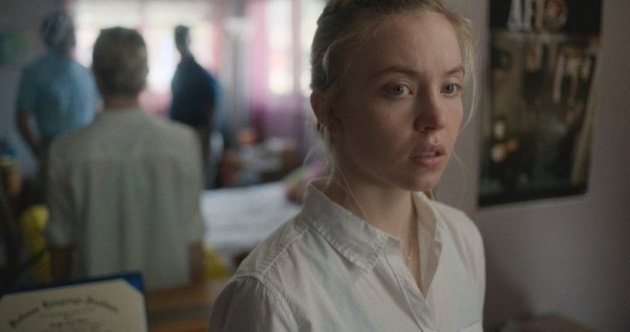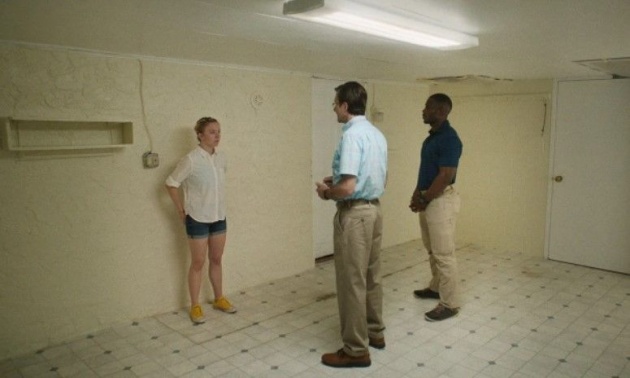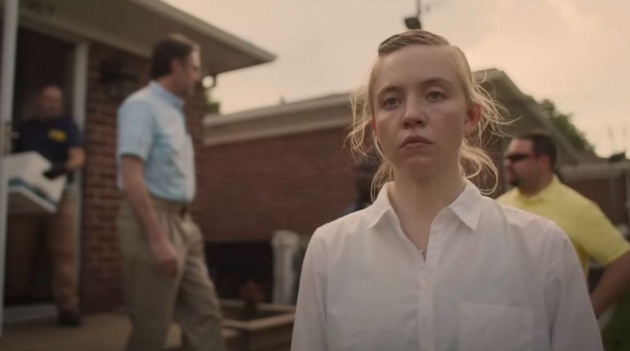
Pictured: Contract linguist Reality Winner (Sydney Sweeney) faces a tough interview in the verbatim drama, 'Reality', co-written (with James Paul Dallas) and directed by Tina Satter. Still courtesy of Vertigo Releasing (UK) / HBO Max (US)
Contains spoilers
Verbatim dramas, in which the dialogue is taken entirely from recorded transcripts of testimony, have become more common in the last two decades. The intention is to place the audience in a room where individuals are subject to questioning. We are encouraged to make up our own mind about a person’s version of events and to ask the question, ‘how could they do it?’ Whether it is to convince the UK Parliament to authorise the military invasion of a country or else mishandle an investigation into the murder of a black British teenager, individuals are shown to be weak, corrupt or in possession of false logic. Verbatim dramas examine the ways in which people account for themselves, but they also encourage the audience to question methods of accountability. How can police disciplinary boards allow suspended officers to return to active duty after being convicted of a crime when a civil servant convicted of that same crime would be dismissed? How can a politician abusing their position to award public services contracts to friends and family in exchange for remuneration be allowed to remain in government? Verbatim dramas only give us a partial view of an individual, defined entirely the words that they speak in a formal setting, which the real-life individual may have rehearsed. Often, the audience finds itself focussing on what is not said, the individual that we only see in unguarded moments in which truth appears as a flash.
Director Tina Satter’s film, Reality, adapted with James Paul Dallas from her stage play, ‘Is This A Room?’, uses only the words spoken by twenty-six year old NSA contractor Reality Winner and the FBI investigating officers questioning her over a two hour period on June 3rd, 2017 to show how her confession was elicited. Their exchanges are telescoped into eighty minutes and at certain points, names and descriptions are redacted – at these moments, Reality disappears from the frame, as if entirely effaced. Satter draws our attention to the recording of dialogue, cutting early on to a shot of sound levels as words are spoken. We also see exchanges shown on screen being transcribed, the basis of the film itself.
Unlike other subjects of verbatim drama, Reality has little, or perhaps, no opportunity to prepare. She is not placed under arrest or interviewed in the presence of legal counsel. Nor indeed is she interviewed by her employer. Regardless of her actions, she is particularly vulnerable, visited by two older men and shown wearing a white blouse and skimpy shorts. Her house, car and phone are subject to a search warrant. The officers want to know whether there is anything in her house that shouldn’t be there, like secret documents. They also want to know if anyone is in the house and if she has any weapons.
When we first see Reality (played by Sydney Sweeney), on May 9th, 2017, she is shown at her work cubicle with her back to us, viewing a document. Above her cubicle are two television screens, both showing the cable news channel CNN and a report on the dismissal of FBI Director James Comey by the then President Donald Trump. The camera is placed at a distance from Reality. We don’t know what she is working on. We don’t even know if this is specific to her crime. The most relevant detail is the dismissal of Comey himself, having been tasked to determine whether Trump had colluded with the Russian Government to ensure his election victory in 2016.
As Reality pulls into her driveway in her white Nissan Cube car, twenty-five days later, two FBI officers, James C. Garrick (Josh Hamilton) and R. Wallace Taylor (Marchánt Davis) approach her, displaying their identification and announcing that they have a search warrant. The seriousness of their arrival is contrasted with the banality of Reality’s concerns. She will facilitate the search of her property, but she wants to put her groceries away first. The officers want to know if the house is occupied. Reality explains that she has a dog, and that it doesn’t like men, a detail that appears to speak volumes. She also has a cat, whom she explains will most likely hide under the bed. The first order of business is securing the dog, but the officers also ask about Reality’s guns. Yes, she has two weapons, one under her bed. She is precise in her description. The officers are keen to secure the firearms or rather make sure that she does not have access to them, before continuing.
So far, and in contrast to many a Hollywood film, the adherence to verbatim dialogue emphasises the social awkwardness of the situation. The officers are reluctant to allow Reality to interfere with her own property, in an attempt either to flee or else hide or destroy documents. Reality’s default response is to comply, but she’s concerned about her pets – not exactly the behaviour of a threat to public safety or national security.
Told that her dog has ‘a good growl going’, Reality stands behind the two officers as they enter. Her AK15, we are told, has been found. The Glock pistol is under the bed. The film quickly jumps to 3:42pm. ‘Close the door for my cat,’ pleads Reality, worried that it might escape, terrified by the activity in the house. More officers arrive, including a beefy looking Latin American chap, described in a caption as ‘unknown male’. Reality’s home is surrounded by yellow police tape. The Evidence Response Team arrives. Reality’s default position is ‘to make it as easy as possible for you guys’, though she doesn’t have much of a choice. In casual chat, Garrick explains that he (too?) had a rescue dog, that is, a formerly stray dog purchased from a pound and given a new home. Finally, the order is given: ‘let’s get the groceries into the fridge’. As if the preservation of consumables were the whole mission.
‘Do you have a room in the house? One that’s empty?’ Reality is asked. The officers are keen to interview her, having emphasised, almost to the point of parody, that the process is ‘voluntary’. Reality explains that there is a room in the back, adding that she doesn’t have much furniture. The house is too big for her needs, but then this is affluent middle America. With her dog and cat secured, the dog in a pen outside, the cat scooped out from under the bed and tied to a heavy item of furniture (Satter returns to this cutaway a few times, as if comparing the cat to Reality), the interview can begin.

Pictured: Not much of a room. Reality Winner (Sydney Sweeney, left) is quizzed by two FBI agents (Josh Hamilton, Marchánt Davis) in the verbatim drama, 'Reality', directed by Tina Satter. Still courtesy of Vertigo Releasing (UK) / HBO Max (US)
Is there banter? A little bit – references to Reality’s exercise regime (power lifting) and to her weight (‘125lbs? You guys flatter me.’) A contract linguist, Reality is asked what languages she speaks. ‘Farsi, Dari and Pashto,’ she explains. ‘Wow,’ says Garrick, ‘I can barely speak English.’ ‘Hard language,’ she retorts. ‘What made you get out of the air force?’ Reality explains that she was looking for an opportunity to deploy her language skills.
The time skips ahead to 4:07pm. Reality is alone in a room with no furniture, standing close to the wall, with two interrogators. The medium shot once again emphasises her vulnerability, as does the choice of actress. The real Reality Winner had physique; Sydney Sweeney does not.
‘I’m going to take notes,’ one of the interrogators explains. Does Reality mind? Reality also has to hand her phone over. ‘Don’t touch it, tell me the password.’ ‘There isn’t one,’ Reality explains. ‘What you just slide it over?’ ‘Yup.’ Incredulous that an NSA contractor would use an unprotected device, the interrogators access the phone.
Reality is then asked about her job, monitoring drone feeds. ‘You were never dismissed?’ she is asked. ‘No,’ she replies. She is then asked about her access to NSA Pulse, a secure intranet containing reports on NSA activity. Did she look at reports? Yes. Did she print them out? Specific reference is made to a named document – the words and the image of Reality are obscured, as if the image itself were about to self-destruct.
What did Reality do with documents she printed out? ‘I shredded them,’ she explained. ‘Tell me how.’ ‘I folded them in half and put them in the burn bag’, Reality explains, adding the location of said bag. ‘You folded them in half?’ repeats her interrogator, as if the detail were especially important. Reality nods.
‘What if I were to tell you that we know more?’ Garrick asks. Reality is reminded that she has an opportunity to tell the truth; ‘we’re here voluntarily.’ Reality affirms that she always destroyed the documents that she read. ‘Why did you print them out?’ ‘Because they are easier to read.’ She also explains that there was a certain document that she wanted to hold in her hand – a piece of history. In a particularly suspicious piece of testimony, Reality adds that she printed out the report and kept it on her desk for three days. Did she secure it? No.
It becomes apparent that the firing of Comey triggered Reality; that she wanted to know more. Her interrogators are keen to suggest that she is not the sort of person who wants to overthrow the government; at various points, Reality explains that she wants to increase her security clearance, that doing so would allow her to undertake more appropriate work, relative to her language skills. Reality had ‘badmouthed’ President Trump online but that of itself does not turn her into a whistle-blower. ‘I’m angry over politics, whatever, but not the person to do this.’
‘Did you take the document out of the building?’ Reality is asked. ‘No,’ she replies. There is ‘very compelling’ evidence that she did smuggle the document outside and mail it to a journalist. ‘It looks really bad, yeah,’ says Reality, backpedalling – you almost imagine her shifting from foot to foot, like a tennis player waiting to receive serve but holding a pitcher’s glove, not a racquet. Eventually, she confesses. She did smuggle the document out, stuffing it down her pantyhose. At this point, the camerawork is expressive, the edges of the frame blurred as if Reality were about the pass out – but, hey, she can match the bench-pressing ability of her interlocutors. ‘And then you sent it to [name redacted, and replaced with a bleep]?’ Reality confirms this. By this time, she seeks to justify her state of mind. ‘I told them to turn off Fox News,’ she cries, as if the pro-Trump propaganda made her do it.
‘You mailed it in an envelope. Where did you get the envelope from?’ asks one of the officers. Reality explains. ‘Where did you mail it from?’ Reality describes the location of the mailbox, on Boston Road.
At a certain point, the two investigators are interrupted – another officer apologising for opening the door. It is only at this point that we discover that the document relates to Russian interference in the 2016 US Presidential election. We discover also that she mailed it to ‘The Intercept’, an online news source that sought information from whistle-blowers – we see the advertisement. By this time, Reality wonders aloud, ‘am I going to prison?’ She is concerned about the welfare of her pets.
It is 4:50pm. There is a brief exchange about the dog (‘oh, she’s a big girl. She’s three years old’). Reality is offered water in a hyper-emergency, ‘someone needs help here’ manner. ‘I do have a TOR browser,’ she explains.
We learn that voter registration played a part in the election result. That the document Reality handled related to this. Reality talks about being in public service. Her role is to protect the public. The stealing of the 2016 US Presidential Election and the aftermath made her ask, ‘why do I have this job?’ Why indeed can they not tell the truth to the public?

Pictured: Reality Winner (Sydney Sweeney) in a scene from the verbatim drama 'Reality', co-written and directed by Tina Satter. Still courtesy of Vertigo Releasing (UK) / HBO Max (US)
Again Reality is told, ‘you don’t seem the type to do this’. Was someone helping her? Did someone put her up to this? Reality wanted to work with Special Forces. The only jobs available were in Iran. Reality felt ‘hopeless.’
5:14pm. Reality has been interviewed for 104 minutes. At 5;17pm, the interview is terminated. Outside her house, she is handcuffed. We hear the real-life Reality winner speak to her sister the next day, arranging for her pets to be taken care of. ‘All they wanted was to know why,’ she explains. Did they think she would ‘burn down the White House?’ The news coverage is unforgiving. One commentator describes her as ‘hating America’. Another refers to the cover up. Reality is convicted and jailed for five years in prison - a sentence designed to have a ‘chilling effect’ on potential whistle-blowers. We learn that she was released in 2021 and ‘tagged’ [monitored] until November 2024, that is until after the next US Presidential election.
The morality of whistle blowing is a subject for debate. Who gets to decide what sensitive information should be made available in the public interest? At what point should news services that receive illegally shared documents turn them in without publishing? Reality prompts us to consider these questions but also to consider the bravery – or brave naivety - of those willing to lose their careers in furtherance of the truth. The tragedy of Reality Leigh Winner’s sacrifice is that there are millions of Americans who believe that President Trump did not harm American democracy, and is not by conventionally agreed criteria, a traitor. For Trump supporters, perhaps the ends justified the means, that the only way to get ‘their man’ into a position of power is to tear down the system that purportedly does not represent them. If these supporters are not considering why they are being asked to tear down that system, by forces that aren’t from their socio-economic group, then perhaps they should. Tina Satter’s film won’t reach them; only the realization – far too late – that they have been conned, might. At time of posting (11 June 2023), Trump himself is being indicted for illegally sharing documents. This might be some comfort for Reality Winner or an example of American Irony.
Reviewed at Soho Screening Rooms, Screen Three, Central London, Wednesday April 5th, 2023, 18:30



